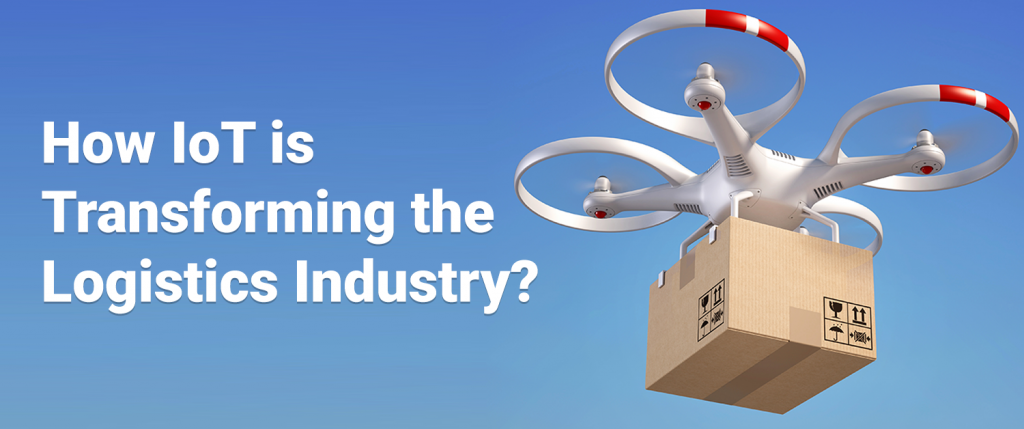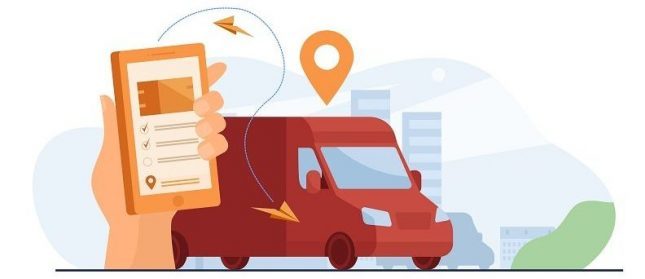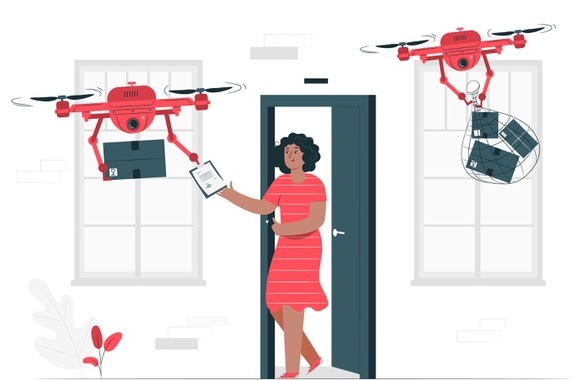
In our last blog, we described how the logistics and transportation industry is digitizing its operations. We also discussed various ways in which you can digitize your fleet management operations. If you have not visited that article, here’s the link to it – 7 Ways To Digitize Your Fleet Management Operations.
In today’s article, we will be covering all about the adoption of IoT in the transportation and logistics industry, and how they are benefiting from it. Let’s get started!
Today, nearly every sector of the world is moving towards a more digital era, and the global trucking sector is no exception. The transportation and logistics industry has evolved a lot since the introduction of digitization in the global market, and the trend is continuing to gain momentum with time. With the advancements in IoT or Internet of Things, the vital aspects of the logistics industry is changing significantly.
IoT in Transportation and Logistics
 IoT in transportation and logistics has completely revolutionized the global trucking sector. Today, the fleet managers are actively using Machine-to-Machine or IoT systems to communicate effectively and to send/receive real-time updates about the fleets and drivers. The adoption of IoT in transportation and logistics has opened many new opportunities for fleet managers to effectively manage their business and to boost the overall productivity of the employees.
IoT in transportation and logistics has completely revolutionized the global trucking sector. Today, the fleet managers are actively using Machine-to-Machine or IoT systems to communicate effectively and to send/receive real-time updates about the fleets and drivers. The adoption of IoT in transportation and logistics has opened many new opportunities for fleet managers to effectively manage their business and to boost the overall productivity of the employees.
The Internet of Things technology provided highly advanced and secure technology to ensure quick delivery, safety of assets, supply chain monitoring, and safe transportation processes. As per Statista, the global companies will invest a whopping amount of $40 billion in the logistics technology by the year 2020. That’s a significant investment in the logistics sector.
From optimizing the usage of resources, to controlling the fleets and driver’s behaviour, IoT in transportation has created a strong impact amongst the fleet managers and customers. Wanted to know how IoT can transform your fleet management operations? Here are some of the ways in which IoT in transportation is proving a boon for the trucking sector!
Also Read- Things to Consider Before Implementing Smart Traffic Management System
1. Provides Real-time Data
The first and the foremost benefit that IoT in transportation is providing to the fleet managers is real-time data. How? Let us understand this way! Do your drivers take unnecessary breaks?? Do they keep the engine on for a long time without actually moving the fleets? Are you unaware of all their activities? If the answer to any of the questions is yea, then you need a connected fleet for your transportation business!
With a smart connected fleet and high-quality sensors, you can seamlessly get all the data related to your driver’s activities and your fleet’s conditions too in real-time. For instance, with high-quality sensors, you can seamlessly get details of situations like harsh braking, harsh acceleration, low pressure level in tires, etc.
Furthermore, the intelligent IoT in transportation vehicles even helps the fleet managers to get updates regarding driver’s driving quality, compliance with regulations, route taken, and so on. All the reports provided by IoT and smart sensors can significantly reduce the wastage of the transportation business. The fleet managers can not only reduce the operational cost, but can even improve the driver’s efficiency by getting all these reports on time.
2. Smart Inventory Tracking
Inventory tracking is another area that has been benefiting from the powerfu;l IoT technology. IoT in transportation and logistics can help fleet managers to their valuable assets in no time, and can even alert them during times of danger.
Furthermore, during inventory tracking especially in large warehouses and stores, one problem that is consistent is to find the right products at the right time. The powerful IoT technology can even solve that issue with a special functionality called Smart Shelf System. With smart shelf features, you need not invest much time in finding the right product amongst all your inventories.
The working of a smart shelf system is also not a complicated one. The shelves are equipped with smart RFID tags and weight sensors. The managers can scan the products to know exactly where they are located and how much they weigh so as to predict the remaining stock. After calculating the remaining stock, they can make better purchase decisions to eliminate stock-out conditions.
3. Drone-Based Delivery
 Drones are not new to the global market. In fact, the usage of drones started as back as 2016, and since then many logistics and supply chain industries have been leveraging IoT-based drones called IoT drones.
Drones are not new to the global market. In fact, the usage of drones started as back as 2016, and since then many logistics and supply chain industries have been leveraging IoT-based drones called IoT drones.
Today, many of the leading logistics and supply chain companies are leveraging IoT in transportation services. A famous example of that is DHL, a German carrier company that is a big name in the logistics sector. DHL, along with a chinese firm developed a completely automated drone to deliver small parcels locally. The IoT-based rone has sensors that enables it to pick up the parcel and deliver it to the right apartment seamlessly. It has GPS navigator to get real-time coordinates of the place.
The IoT drone even has a security system so that nobody could steal the deliverable. The dispatchers provide a unique code to each of the users which they have to enter to receive the parcel from the drone. Not only that, but with a more advanced IoT technology, the drones today are even leveraging facial recognition technology to eliminate the theft and fraud situations.
4. Supply Chain Visibility
Supply chain management is a long series of operations that takes place from ordering of raw materials to synthesis of complete finished products. It is a vital industry that serves various clients and customers related to sectors like farming, designing, manufacturing, and so on. Now, since the product goes from many stages to become a final component, there are many instances where the detection of a problem becomes a complicated task.
IoT in logistics can solve all those issues in an effective manner. Meaning, the robust IoT technology can trace the products in real-time preventing any order errors, and can also provide valuable tracking data to all your clients and customers. That enhanced visibility in supply chain operations leads to increased profits, better communication, and reduced disruptions.
Apart from that, the IoT sensors can even track the speed of the delivery vehicle and measure the weather conditions in advance to safeguard any perishable goods. This highlights the significance of IoT product development, as it eventually helps you deliver the right and high-quality products to your customers quickly and efficiently.
5. Warehouse Management
Warehouse management is also one of the crucial areas of the logistics and transportation industry that is benefiting from the IoT technology. An effective management of the warehouse operations can help you to streamline all your supply chain and logistics operations more quickly and efficiently.
IoT technology is once again a perfect tool to better manage the warehouse operations. Smart sensors and IoT enabled mobile apps can seamlessly help you to track all your fleets, warehouse data, and inventories that can further make you stand apart from the competitive market.
Additionally, IoT in transportation and logistics can also capture the real-time data of routines while minimizing the human intervention. As such, you can seamlessly reduce various critical damages like incorrect deliveries, refunds, fuel wastage, goods shrinkage, and so on.
6. Predictive Analysis
Apart from getting timely fleet and driver’s updates, it is also crucial to get real-time fleet’s performance updates. Getting information on how your certain fleets are performing in rewal-time is also crucial for your logistics and transportation business growth. Manually, this process seems a little tedious, but, with IoT technology, it is a piece of cake.
IoT in transportation and logistics has enabled the business to get timely updates of all the performance issues of the fleets in real-time. Meaning, now the fleet managers can know how smooth their delivery vehicles are running at a certain period. In other words, they can get every little detail about their fleets like coolant temperature, engine alerts, ignition period, inspection reminders, and so on.
Once the fleet manager gets all those vital reports, they can seamlessly make future preventive maintenance strategies. They can decide whether to repair the fleet, change any part, or to replace the fleet. All in all, by getting the alerts on correct time, the fleet managers can reduce the damages occurring in the fleets and can increase their lifetime.
7. Geo-Fencing
Often it is seen that the fleet drivers, in absence of information, take the wrong routes and as a result they either damage the fleets, take time to deliver products, or put their lives at risk. That can even hamper the company’s name at question, and sometimes could even result in big economical losses.
To eliminate such conditions, the IoT technology in cooperation with effective fleet management software provides geo-fencing functionality. With geo-fencing features, you can seamlessly create virtual boundaries across the locations they do not want their vehicles to travel. So, now, if any vehil;ce will enter into a restricted location, then you will instantly get alerts on your smartphone and web-based fleet management software. Amazing, isn’t it?
Geo-fencing feature is one of the most crucial functionality provided by IoT technology as it helps to mitigate the losses and damages caused by taking the wrong routes. The drivers could feel safe and the products could be delivered timely while using geo-fencing features.
8. Increased Driver Safety
![]() Last but not least, we have driver safety. As discussed in the point mentioned above, apart from safeguarding the fleets and other valuable assets, the safety of drivers is also one of the most concerned issues of the logistics and transportation industry. Instances like over driving, taking wrong routes, critical weather conditions, and fault in fleets can risk the lives of the drivers significantly.
Last but not least, we have driver safety. As discussed in the point mentioned above, apart from safeguarding the fleets and other valuable assets, the safety of drivers is also one of the most concerned issues of the logistics and transportation industry. Instances like over driving, taking wrong routes, critical weather conditions, and fault in fleets can risk the lives of the drivers significantly.
To avoid such circumstances and to safeguard your most crucial asset, you need to adopt IoT in transportation and logistics. With fleet management software incorporated with IoT technology, you can seamlessly alert your driver of all the issues mentioned above. IoT in transportation seamlessly senses all the faults in the fleets, and even provides optimized routes for a safe and quick delivery.
Besides that, IoT technology even provides accurate weather forecasting reports so that your fleets and drivers could be secured against any bad weather crisis. Additionally, through smart sensors, the drivers can also communicate with the fleet managers about traffic delays, accidents, and medical emergencies, while driving the vehicles. That specifically enhances the customer experience as you can provide an exact date of delivery to all your customers.
Wrapping Up!
So, those were some of the ways in which IoT technology has benefitted or is benefiting the logistics and transportation industry. To conclude, we can say that things are changing drastically in today’s tech-driven world, and transportation is no exception. The ever growing customer needs and increased competition in the market has compelled many businesses to find new ways of managing their fleet operations. In such a scenario, IoT has become a vital tool for the transportation and supply chain business.
Things like self-driving cars, drone services, and IoT enabled fleet management software became a global trend today, and solved many of the leading fleet management problems. After witnessing the huge success of the trucking industry, we can say that IoT in transportation and logistics is a sure shot way of gaining success in today’s competitive world!
Want to digitize your transportation and logistics business? We are always here to help you! We, at Matellio, have years long experience in providing an effective digital transformation strategy to almost all the leading industries of the global market. Our IoT experts and trusted engineers promise to deliver an efficient and scalable product to enhance your fleet and transportation experience. Have more questions? Feel free to reach us and we will solve all your queries!



